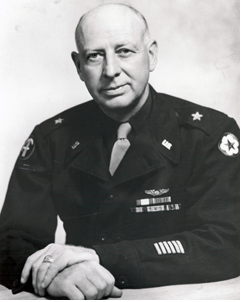Brigadier General
John W. Coffey
 Brigadier General John W.
Coffey's entire 34 years of military service were a source of continuous contributions to the United States Army.
Brigadier General John W.
Coffey's entire 34 years of military service were a source of continuous contributions to the United States Army.
During World War II, he helped lay the groundwork for the logistics effort which would lead to victory. In late 1941, with the United States entry into the war, General Coffey was appointed Ordnance Officer, European Theater. In 1942, when the Western Task Force landed an invasion force in North Africa, General Coffey was appointed Ordnance Officer, North African Theater, and was responsible for providing support for operations in North Africa, Sicily, and Italy. In August 1943, he became Chief Ordnance Officer, Mediterranean Theater, during which time he was awarded the Distinguished Service Medal.
In August 1945, General Coffey assumed command of Letterkenny Ordnance Depot, the largest Army installation of its type at the time. For the next two years, the depot, under his direction, assisted in the demobilization of the Army. The depot's mission expanded to include a whole range of activities to include renovation, repair, packaging, storage, disposal, and destruction of a wide variety of items in the Army's inventory.
His leadership and management skills during this period were central to the successful transition of the depot from war to peace. Despite the advent of new missions in the face of reduced manpower and financial resources, he was able to maintain the depot's productivity. The resilience of Letterkenny Army Depot was due in large part to General Coffey's post-war administration. General Coffey made a truly remarkable impact on the Ordnance profession and on Defense Logistics.